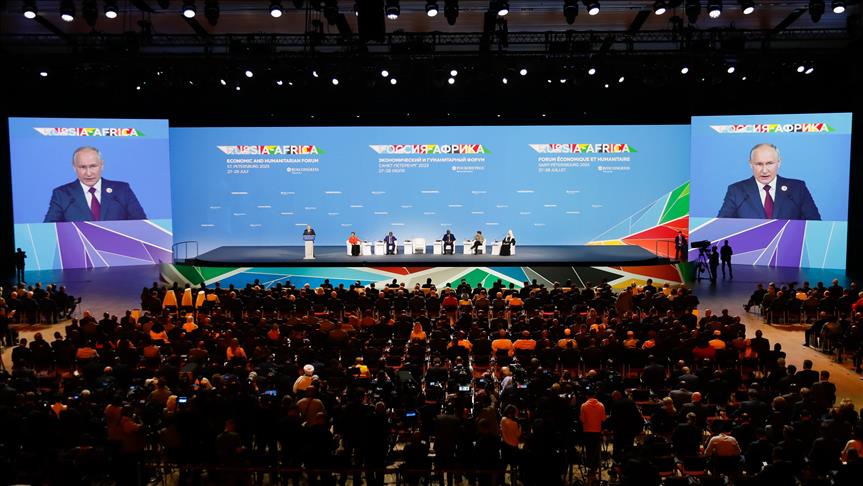A top Russian official has endorsed Türkiye's role as a facilitator as the country seeks to be an energy hub and facilitate natural gas trade to European markets amid rising energy prices and potential shortages.
"Russian President Vladimir Putin agreed to build this energy hub through Türkiye, where a large amount of energy resources for Europe will pass through," Sergey Vostretsov, head of the association of trade unions of Russia, SOTSPROF, told Anadolu in Saint Petersburg, where he attended the second Russia-Africa Summit.
Since last October, when Turkish President Recep Tayyip Erdogan and Russian President Vladimir Putin met in Kazakhstan's capital Astana, the idea of transforming Türkiye into a regional hub for the delivery of Russian natural gas has been a hot issue.
Russian gas makes up a significant portion of Türkiye's total gas imports, accounting for approximately half of its total consumption. Russian gas is transported to Türkiye through the TurkStream pipeline, which stretches 930 kilometers (580 miles) under the Black Sea.
Turkish and Russian energy cooperation was extended to the nuclear sector after Türkiye inaugurated its first nuclear reactor, which was financed by Moscow and built by Russian energy giant Rosatom last year. The reactor, which is part of a wider joint project to build four nuclear power plants, is located near the Turkish town of Akkuyu.
"We appreciate Türkiye in this regard because it will help both countries create more jobs and expand their respective economies," Vostretsov said.
Russia's economy has been hit by unfolding sanctions specifically targeting its finance sector as well as oil and natural gas exports to undercut Moscow's wartime spending.
Vostretsov said despite the pressure on Türkiye as a NATO member, the country managed to walk a fine line owing to its "wise leadership."
"Türkiye avoids various conflicts because it is not their conflict, and they always take a peaceful position. We, in Russia, appreciate the efforts that the Turkish government is making towards a peaceful settlement," he said.
- German economy would be negatively impacted without Russian energy resources
Amid rising tensions in the Russia-Ukraine conflict, with several EU nations and the US providing ammunition and weaponry to support Ukraine on the ground and in the air, Europe continues to face risks fueled by a lack of alternatives to Russian fossil resources.
EU countries have either stopped or restricted crude oil and natural gas imports from Russia despite their high dependency on Moscow's resources.
Germany has also been overly dependent on Russian supplies due to its very close energy ties with pre-war Russia. However, difficulties emerged from record oil and food prices for businesses dealing with costlier expenses, as well as for German households whose incomes have dropped while grappling with high inflation.
Voicing concerns about Germany’s energy sector as "the EU is forced to run on liquefied gas from the US", Vostretsov said this means fewer jobs for Germany.
"Russia has found new routes, and immediately reoriented toward the East since everyone needs access to affordable energy supplies. And as a result, India and China literally grabbed all of the volumes that Europe was taking," he said.
Meanwhile, political analyst Gregory Spitzen said German authorities are not interested in restrictions against Russia as the German economy needs Russian natural gas and minerals.
"Germany was the locomotive of the European economy," Spitzen said, underscoring that the German economy would be negatively impacted without cheap Russian energy resources.
By Oguzhan Ozsoy in Saint Petersburg
Anadolu Agency
energy@aa.com.tr


